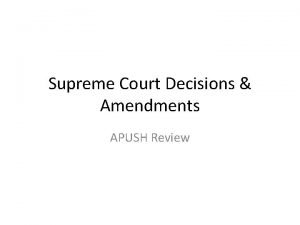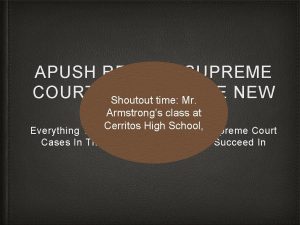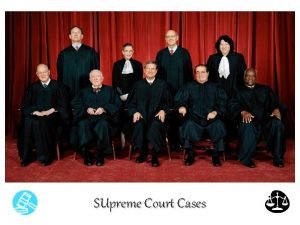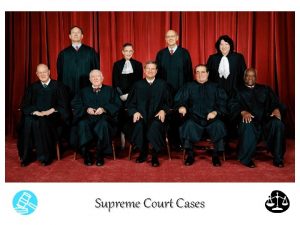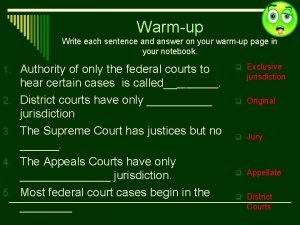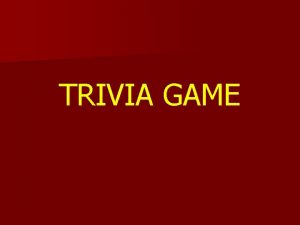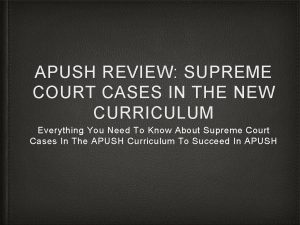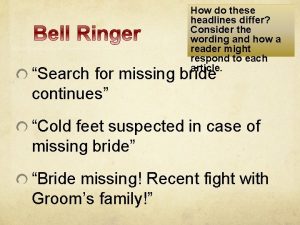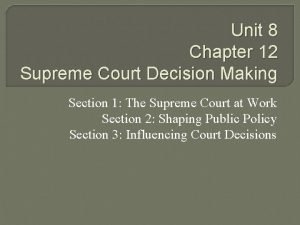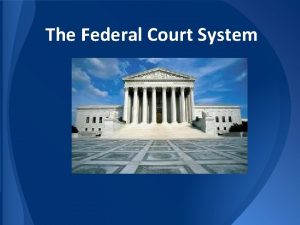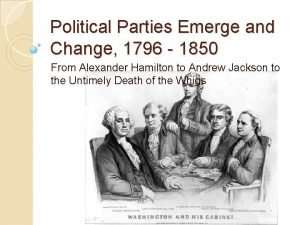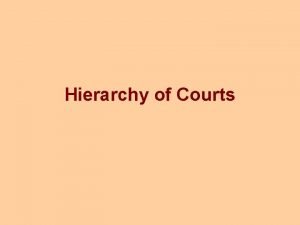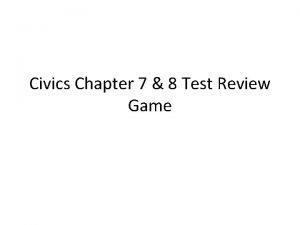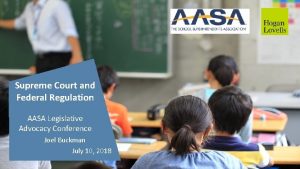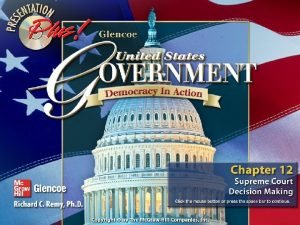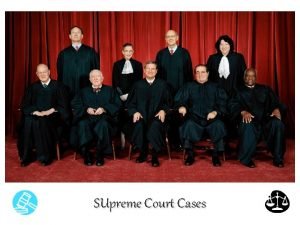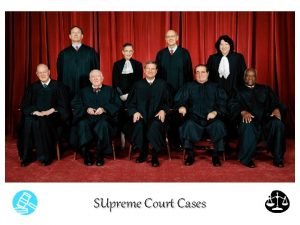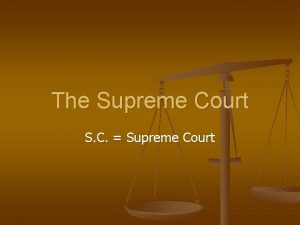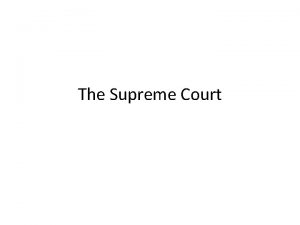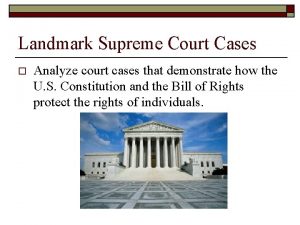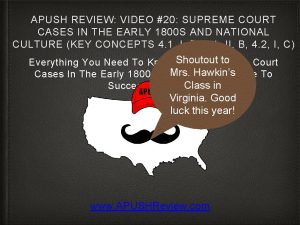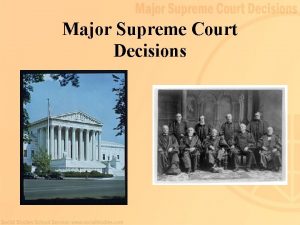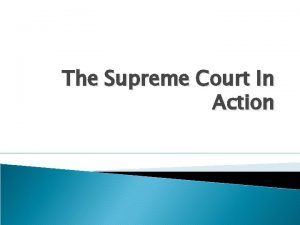APUSH REVIEW SUPREME COURT CASES IN THE NEW














- Slides: 14

APUSH REVIEW: SUPREME COURT CASES IN THE NEW Shoutout time: Mr. Armstrong’s class at CURRICULUM Cerritos High School, Everything You Need To Know About Supreme Court Cases In The APUSH Curriculum To Succeed In APUSH

The Court In The Early 19 th Century • Key Concept 4. 1, I, B: • “Supreme Court decisions established the primacy of the judiciary in determining the meaning of the Constitution and asserted that federal laws took precedence over state laws. ” • What court case established the “primacy of the judiciary…. ”? • Marbury v. Madison - established Judicial Review • Supreme Court can declare a law

The Court In The Early 19 th Century • Key Concept 4. 1, I, B: • “Supreme Court decisions established the primacy of the judiciary in determining the meaning of the Constitution and asserted that federal laws took precedence over state laws. ” • What court cases “asserted that federal laws took precedence over state laws”? • Gibbons v. Ogden - Congress has sole control over INTERstate trade, not states • Mc. Culloch v. Maryland - BUS is constitutional, states CANNOT tax federal agencies

The Court In The Early 19 th Century • Key Concept 4. 2, I, C: • “Legislative and judicial systems supported the development of roads, canals, and railroads……. ” • What court case supports this statement? • Charles River Bridge (1837) • Contracts could be altered to benefit the general welfare • Charles River Bridge company lost its monopoly on the Charles River

**Dred Scott** (Specifically Mentioned) • Key Concept 5. 2, II, B: • “The courts and national leaders made a variety of attempts to resolve the issue of slavery in the territories……. . Dred Scott decision, but ultimately failed to reduce conflict” • What was the impact of the Dred Scott decision? • Declared that ALL African Americans were NOT citizens • Slaves were deemed property, could not be taken away • Congress could NOT legislate slavery in the territories Missouri Compromise was unconstitutional • Split the Democratic Party along sectional lines (N/S)

The Court In The Late 19 th Century • Key Concept 5. 3, II, E: • “Segregation, violence, Supreme Court decisions…… stripped away African American rights…. . ” • What court case supports this statement? • Civil Rights Cases (1883): • Congress could NOT outlaw racial discrimination by private individuals and/or groups

***Plessy v. Ferguson*** (Specifically Mentioned) • Key Concept 6. 3, II, C: • “The Supreme Court decision in Plessy v. Ferguson that upheld racial segregation helped to mark the end of most of the political gains African Americans made during Reconstruction. ” • What was the impact of this court case? • “Separate but equal” • The South focused on separate - facilities were never equal

The Supreme Court and the WWI • Key Concept 7. 2, I, C: • “Official restrictions on freedom of speech grew during WWI. ” • What court case support this statement? • Schenck v. US: • “Clear and present danger” • During times of war and crisis, civil liberties decrease (connect to Lincoln’s suspension of habeas corpus during the Civil War)

The Supreme Court and the New Deal • Key Concept 7. 1, III, B: • “… While conservatives in Congress and the Supreme Court sought to limit the New Deal’s scope. ” • What court cases support this statement? • Butler v. US: • Declared the AAA unconstitutional • Schechter Poultry v. US: • Declared the NIRA unconstitutional • As a result, FDR proposed the Court Packing Plan, but the never had the support to create it

WWII and the Supreme Court • Key Concept 7. 3, III, C: • “Wartime experiences also generated challenges to civil liberties, such as the internment of Japanese Americans” • What court cases support this statement? • Korematsu v. US • Upheld the legality of FDR’s executive order of Japanese internment • Fear of subversion • No evidence of ANY people interred were spying • Impact of court case?

***Brown v. Board*** (Specifically Mentioned) • Key Concept 8. 2, I, B: • “The three branches of the federal government used measures including desegregation of the armed services, Brown v. Board of Education… to promote greater racial equality” • What did Brown v. Board do? • Declared school segregation unconstitutional • Used the 14 th amendment to support this • What was the impact? • Milestone in the Civil Rights Movement • Led to Southern resistance - Southern Manifesto, Little Rock 9, Massive Resistance

The Supreme Court During the 1960 s (Great Society) • Key Concept 8. 2, III, B: • “…. . A series of Supreme Court decisions expanded civil rights and individual liberties” • What court cases support this statement? • Miranda v. Arizona: • People must have rights read to them at time of arrest (attorney, remain silent - 5 th amendment) • Escobedo v. Illinois: • Right to an attorney at time of arrest • Tinker v. Des Moines • Students can wear black armbands as a sign of protest - free speech

Test Tips • Multiple-Choice and Short Answer: • If it is specifically mentioned, know the details of the case • Be able to provide examples of cases that support the statements made in the curriculum • DBQ and Essays: • Likely part of a larger theme - Civil Rights

Thanks For Watching! • Best of luck on all your exams • Check out other review videos in the description
 Apush amendments review
Apush amendments review Apush court cases
Apush court cases Supreme court cases graphic organizer answers
Supreme court cases graphic organizer answers Cohens vs virginia apush
Cohens vs virginia apush How cases reach the supreme court worksheet answers
How cases reach the supreme court worksheet answers Is there a basketball court above the supreme court
Is there a basketball court above the supreme court Court cases apush
Court cases apush What do these headlines say about how the supreme court
What do these headlines say about how the supreme court Vocabulary activity 12 supreme court decision making
Vocabulary activity 12 supreme court decision making Supreme court justice system
Supreme court justice system Political parties
Political parties Jurisdiction of supreme court
Jurisdiction of supreme court The u.s. supreme court works chiefly as a(n)
The u.s. supreme court works chiefly as a(n) Supreme court does
Supreme court does Supreme court does
Supreme court does
